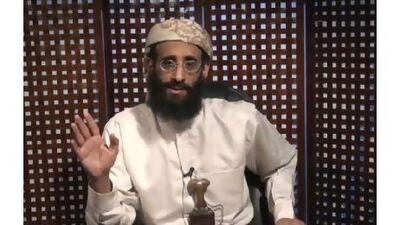WASHINGTON // Civil rights groups last week were dealt a significant setback when a US federal court ruled it lacked the authority to review a case filed on behalf of the father of a Yemeni cleric who is allegedly on the Obama administration's targeted killings list.
Maria Lahood, a staff attorney with the Centre for Constitutional Rights (CCR), which filed the case along with the American Civil Liberties Union (ACLU), argued that the ruling granted unreviewable authority to the administration.
"It means that the US government can kill its own citizens abroad, at least, and no court can do anything about it," she said.
Courts lack the tools to check the administration, Paul Rosenzweig, a visiting fellow with the Heritage Foundation, a Washington-based think tank, said. "Almost certainly, courts are ill equipped [to check the executive's enforcement of targeted killings]."
Anwar al Awlaki is accused of being an operational member of al Qa'eda in the Arabian Peninsula and US authorities have linked him to at least five attacks on Americans, including the Times Square car bomb in May, the shootings at Fort Hood in November last year and, also last year, the Christmas Day underwear bomber on a flight headed to Detroit.
He has allegedly been placed on a "kill list" by the US administration, although officials refuse to confirm or deny the existence of such a list.
Judge John D Bates ruled last Tuesday that the District Court of Washington, DC lacked the legal purview to rule on what was a "political question", and that Nasser al Awlaki did not have the right to bring the case on behalf of his son, who the judge said should come forward himself.
That latter ruling was deemed unrealistic by Ms Lahood, who pointed out that if the younger al Awlaki was on a kill list, how could he come forward?
"Anwar couldn't bring the case if he came out of hiding and surrendered himself as the government is saying he should [because the government is actively trying to kill him], even though there are no charges against him," she said. "And he couldn't bring the case certainly afterwards. So there is no time, essentially, that the government will concede that this case could be brought."
The ACLU and CCR also challenged the presumption that a targeted killing policy could apply to Yemen, a country the US is not officially in conflict with, and where Anwar al Awlaki is believed to be in hiding. "We submitted evidence that, first of all, there isn't an armed conflict in Yemen. Any hostilities there don't rise to the level of armed conflict. And we submitted evidence that al Qa'eda in the Arabian Peninsula (AQAP) is actually not a part of al Qa'eda. The Aumf [the authorisation of the use of armed force] actually pertains to 9/11 and the people responsible for 9/11," Ms Lahood said.
But Mr Rosenzweig argued that if the courts were not equipped to rule on such a case, any targeted killing policy anywhere was ultimately a political question to be decided by the relevant national and international actors.
"The right checks are political more than anything else. The most significant check on targeted killings in Yemen is what [Ali Abdullah] Salah, the president of Yemen, thinks," he said.
Under the US constitution and international law, targeted killings are permissible, but only as a last alternative to neutralise an imminent threat.
"The threshold question there is: 'is he operational?'" said David Rittgers, a legal policy analyst with the Cato Institute, a libertarian think-tank in Washington. "That is the part where the really tough questions come, because for the government to release information that it has that substantiates a claim that he is operationally involved with a terrorist operation may compromise methods and sources that would indicate how they got the information."
That was reflected in Mr Bates's ruling, in which he acknowledged that his decision was disquieting.
"The court recognises the somewhat unsettling nature of its conclusion - that there are circumstances in which the executive's unilateral decision to kill a US citizen overseas is constitutionally committed to the political branches and judicially unreviewable," Mr Bates wrote. "But this case squarely presents such a circumstance."
Letta Tayler, a researcher at the terrorism/counterterrorism division of Human Rights Watch, a New York-based human-rights watchdog, said that ultimately what was being challenged by the case was not the legality of targeted killings, but a lack of transparency in the process: "The ruling only highlights the need for the government to shed further light on its targeted killing policy."

